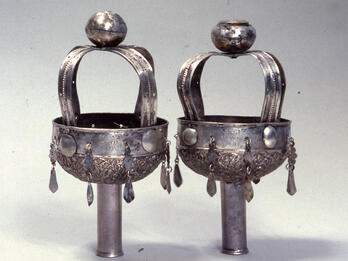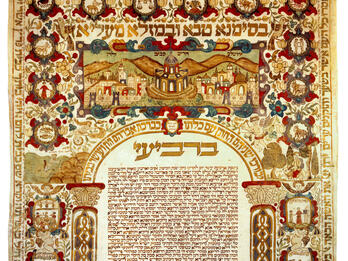Notisias dos Judeos de Cochim (Report on the Jews of Cochin)
A report of the warm welcome accorded to us by our brethren residing in upper Cochin on the Malabar Coast, together with other details appended hereto.
Moved by the fraternal love nourished in my breast, after having decided to head for these parts, I always yearned fervently to see myself meeting with our brothers in Cochin, until the Lord granted me this boon on Thursday, November 21, 1686, when we landed (at 3 p.m.), after an hour’s delay, accompanied by Commander Vosburg, to whose house David Castiel and Joseph Zackay made haste (on behalf of the kehilah [local Jewish community]) to congratulate us on our arrival, doing so with such tearful and joyous demonstrations of affection occasioned by their great joy at our presence, for they resembled us in no small measure, and reciting with them the verses of the royal psalmist [David]: “This is the day which the Lord hath made; we will rejoice, etc.” and together we embarked on a ship that the Commandant had prepared for us to travel to upper Cochin, where Medular1 David Levy came to receive us (with great displays of welcome) and took us as lodgers to his home, where we found everything to our liking. The kehilah, who came to greet us so happily and joyously that it bore explanation, I had deemed myself unworthy of their affection, for it is certain that they could not get their fill of us or embrace us enough nor give thanks to God (they said) for having shown them such great goodness.
The following day, the 22nd, the ḥazan [cantor] Belilia came to visit us, with the same remonstrations as the others, since the joy of these people was so great and pervasive, that I affirm to my brethren that, had the Messiah entered into their midst, I do not know whether they would have welcomed him more enthusiastically, for I too, for my part, can assure you that I fully reciprocated because my soul was as joyous as theirs.
On the 23rd, Sabbath night, we were in synagogue for the first time, where they communicated to us their pleasure by singing various pizmonim [hymns] of thanksgiving for God having revealed to them their brethren from such distant lands, whom they cherished greatly.
On the 24th, in the morning, they played us a serenade, composed of six drums, six trumpets, and six maracas, whose harmony was rather pleasing, but even more so was the splendid dinner that David Rahy accorded us, which was attended with such great enthusiasm that your own would not exceed it, when God grants me the boon to return to this city.
On the 25th, in the morning, I went to the city to thank the Commander for the hospitality shown to our nation, imploring him that it be continued, for, in the afternoon, we traveled to Anguicaymal (on the other side of the river),2 encountering halfway across a boat that had come to welcome us, to the sound of many musical instruments, and accompanied us with their harmony up to the beach, where we disembarked amid a great throng of people, who had come to greet us and took us in a procession through a very long street, with such festive acclaim that I shed a few tears before reaching the synagogue, when the sages and the ḥazan came out (two hundred paces [from the entrance]) to welcome us and take us there with an increased multitude of people, in whose company we prayed the afternoon service. Later we went up to a gallery (above the azara [women’s section]), where we found the table set with exquisite care and fine victuals, as their circumstances permitted. And after spending two hours there, we were conducted (to the accompaniment of musical instruments and street illumination) to another synagogue, where we prayed the evening service, after which we proceeded to the embarkation point; they accompanied us to our home, from which they very happily returned to their own homes.
On the 26th, Elia and David Castiel gave a dinner in our honor and it was as plentiful and lovely as the one tendered by Rahy. The same hospitality took place on the 27th, in the home of Juda and David Askenazim, where we stayed until three in the afternoon. We then embarked (on two boats) for the city, accompanied by the ḥ[azan] and the k[ehilah], who brought another two people with instruments whose melodious music together with a litany of psalms and hymns burst forth. We sailed along until we arrived at the city, where they took us with the same degree of rejoicing (except for the psalms) to the Commander’s home, where we all entered, and he came out to welcome us most civilly. He, together with the entire k[ehilah], spent an hour conversing with us, during which I thanked him again (for his kindnesses to those present), confident that we would reciprocate whenever occasions presented themselves to be of service to him. When my brief discourse was at an end, the ḥ[azan] came over to give me his blessing, with such affection, that the Commander cried, causing me to follow suit, for an even better reason, as did everyone in attendance. We took our leave of them and they went home, feeling very sad. We remained in the Commander’s home, feeling no less aggrieved, until the next morning when eight or ten of the leading members of the community returned (to feel more pained) and accompanied us until we weighed anchor. The sages and some people from the other side of the river did the same, some coming so laden with copious gifts, that I could not find the words to express our gratitude, more so at the tears and sighs they manifested toward us and the great sorrow they felt at our imminent departure. I could hardly believe their sincerity and the love that they had shown us, in the continuous merrymaking they performed for us, each one seeking tokens and gifts with which to regale us and wearing festive garb, while many were cloaked in mourning as though they had recently lost parents and brethren.
Notes
[Medular denotes a captain carrying a cane embossed with a gold head bearing the company’s coat-of-arms.—Trans.]
[This entire place was inhabited by Malabar Jews, who had two synagogues there.—Trans.]
Credits
Published in: The Posen Library of Jewish Culture and Civilization, vol. 5.






